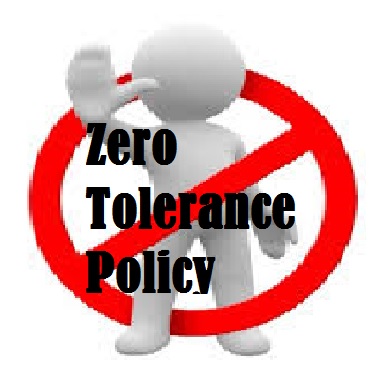Impact of Zero Tolerance Policy on Society Safety
Explore the impact and controversy surrounding zero tolerance policy. Can these policies effectively keep society safe, or do they lead to unintended consequences? Understand the debate and implications of enforcing strict measures.
COMMUNITY


About Zero-Tolerance Policy
Zero-tolerance policy is a strict approach, implying that any rule violation is unacceptable and will not be tolerated. This approach prioritizes mandatory punishment rather than considering the consequences of violations. Unfortunately, such policies can turn minor issues into complex and controversial problems, leading to unfairly harsh penalties. However, when properly implemented, zero-tolerance policies can increase safety by establishing unambiguous standards and consistently ensuring compliance.
Zero-tolerance policies can potentially improve safety by setting clear standards and consistently enforcing them. This approach is often applied in various contexts to enforce strict adherence to rules and regulations, prevent undesirable behavior, and ensure safety. However, the effectiveness of these policies depends on how they are implemented and whether they are balanced, considering the context and individual circumstances. It is essential to recognize that they can lead to unintended negative consequences if applied without due consideration. Therefore, effectively maintaining the security of society depends on a balance of strict government enforcement and a flexible, context-sensitive approach.
Drawbacks of Zero-Tolerance Policy
Initiates and Increases Social Injustice
Some administrations implement zero-tolerance policies that lead to political capture, violence, and social injustice. This approach is seen as unfair because it does not treat all individuals equally. An example of such an administration can be found in Bangladesh, where the implementation of the zero-tolerance policy abandons good judgment, foresight, and discretion, and introduces zero tolerance.
Overemphasis on Punishment
A zero-tolerance policy encourages harsh punishment. Politically sanctioned punishments are ignored or condoned for high achievers or some in influential houses. It focuses more on punitive measures rather than addressing the underlying causes of behavior, which can worsen in the long run. As a result of the lack of flexibility, ordinary people may face disproportionately harsh consequences for minor infractions, which should be considered.
Stresses Relationships Within Communities
Strict enforcement creates tension and strains relationships between authorities and communities. The administration establishes zero tolerance with mandatory consequences, leaving no room for error, as they aim for a foolproof system. Hence, this approach has significant implications for suspicion and mistrust within the community. In any situation, people have no chance to interact and prove themselves right.
Creates Unintended Consequences for Ordinary People
Zero tolerance sometimes leads to unintended adverse consequences. As such, these policies unnecessarily funnel individuals into the criminal justice system for minor infractions, resulting in over-policing and disproportionate punishment. Additionally, zero-tolerance creates an environment of fear and discourages people from reporting serious problems for fear of severe punishment.
জিরো-টলারেন্স নীতি সম্পর্কে
জিরো-টলারেন্স নীতি হল একটি কঠোর পদ্ধতি, যা বোঝায় যে কোনো নিয়ম লঙ্ঘন অগ্রহণযোগ্য এবং সহ্য করা হবে না। এই পদ্ধতি লঙ্ঘনের পরিণতি বিবেচনা করার পরিবর্তে বাধ্যতামূলক শাস্তিকে অগ্রাধিকার দেয়। দুর্ভাগ্যবশত, এই ধরনের নীতিগুলি ছোটখাটো সমস্যাগুলিকে জটিল এবং বিতর্কিত গুরুতর সমস্যায় পরিণত করতে পারে এবং অন্যায়ভাবে কঠোর শাস্তির দিকে নিয়ে যেতে পারে। যাইহোক, যখন সঠিকভাবে প্রয়োগ করা হয়, শূন্য-সহনশীলতা নীতিগুলি দ্ব্যর্থহীন মান স্থাপন করে এবং ধারাবাহিকভাবে সম্মতি নিশ্চিত করে নিরাপত্তা বাড়াতে পারে।
জিরো-টলারেন্স নীতিগুলি স্পষ্ট মান নির্ধারণ করে এবং ধারাবাহিকভাবে প্রয়োগ করে নিরাপত্তার উন্নতি করতে পারে। নিয়ম ও প্রবিধানের কঠোর আনুগত্য প্রয়োগ করতে, অবাঞ্ছিত আচরণ প্রতিরোধ করতে এবং নিরাপত্তা নিশ্চিত করতে প্রায়শই বিভিন্ন প্রসঙ্গে প্রয়োগ করা হয়। যাইহোক, এই নীতিগুলির কার্যকারিতা নির্ভর করে কিভাবে সেগুলি বাস্তবায়িত হয় এবং প্রেক্ষাপট এবং ব্যক্তিগত পরিস্থিতি বিবেচনা করে তারা ভারসাম্যপূর্ণ কিনা। যথাযথ বিবেচনা ছাড়াই প্রয়োগ করা হলে এগুলি অনিচ্ছাকৃত নেতিবাচক পরিণতির দিকে নিয়ে যেতে পারে তা স্বীকার করা অপরিহার্য। অতএব, কার্যকরভাবে সমাজের নিরাপত্তা বজায় রাখা কঠোর সরকার প্রয়োগের ভারসাম্য এবং একটি নমনীয়, প্রসঙ্গ-সংবেদনশীল পদ্ধতির উপর নির্ভর করে।
জিরো-টলারেন্স নীতির ত্রুটি
সামাজিক অবিচারের সূচনা করে এবং বাড়ায়
কিছু প্রশাসন শূন্য-সহনশীলতার নীতি বাস্তবায়ন করে যা রাজনৈতিক দখল, সহিংসতা এবং সামাজিক অবিচারের দিকে পরিচালিত করে। এই পদ্ধতিটি অন্যায্য হিসাবে দেখা হয়, কারণ এটি সমস্ত ব্যক্তির সাথে সমান আচরণ করে না। বাংলাদেশে এমন একটি প্রশাসনের উদাহরণ পাওয়া যেতে পারে, যেখানে জিরো-টলারেন্স নীতির বাস্তবায়ন ভাল বিচার, দূরদর্শিতা এবং বিচক্ষণতা পরিত্যাগ করে এবং শূন্য সহনশীলতার পরিচয় দেয় এবং ব্যবহার করে।
শাস্তির উপর অত্যধিক জোরও দেয়
জিরো-টলারেন্স নীতি কঠোর শাস্তিকে উৎসাহিত করে। উচ্চ অর্জনকারী ব্যক্তি বা প্রভাবশালী ঘরের কিছু লোকের জন্য রাজনৈতিকভাবে অনুমোদিত শাস্তি উপেক্ষা করা হয় বা ক্ষমা করা হয়। এটি অন্তর্নিহিত আচরণের কারণগুলিকে মোকাবেলা করার পরিবর্তে শুধু শাস্তিমূলক ব্যবস্থার উপর বেশি ফোকাস করে, যা দীর্ঘমেয়াদে আরও খারাপ হতে পারে। নমনীয়তার অভাবের ফলে, ছোটখাটো লঙ্ঘনের জন্য সাধারণ ব্যক্তিদের অসামঞ্জস্যপূর্ণভাবে কঠোর পরিণতি হতে পারে, যা বিবেচনা করা উচিত।
সম্প্রদায়ের মধ্যে সম্পর্কের চাপ সৃষ্টি করে :
কঠোর প্রয়োগ কর্তৃপক্ষ এবং সম্প্রদায়ের মধ্যে উত্তেজনা সৃষ্টি এবং সম্পর্কের চাপ সৃষ্টি করে। প্রশাসন কেবল বাধ্যতামূলক ফলাফলের সাথে শূন্য সহনশীলতা প্রতিষ্ঠা করে, যেখানে ত্রুটির জন্য কোনও জায়গা রাখে না, কারণ তারা একটি নির্বোধ ব্যবস্থা চায়। তাই, এই পদ্ধতি সম্প্রদায়ের মধ্যে সন্দেহ এবং অবিশ্বাসের জন্য উল্লেখযোগ্য প্রভাব ফেলে। যে কোন পরিস্থিতিতে, মানুষের মিথস্ক্রিয়া করার এবং নিজেদের সঠিক প্রমান করার সুযোগ থাকে না।
সাধারণ মানুষের জন্য অনিচ্ছাকৃত পরিণতি তৈরী করে :
জিরো টলারেন্স কখনও কখনও অনিচ্ছাকৃত প্রতিকূল পরিণতির দিকে নিয়ে যায়। যেমন, এই নীতিগুলি অপ্রয়োজনীয়ভাবে ছোটখাটো লঙ্ঘনের জন্য ব্যক্তিদের ফৌজদারি বিচার ব্যবস্থায় নিয়ে যায়, যার ফলে অতিরিক্ত পুলিশিং এবং অসামঞ্জস্যপূর্ণ শাস্তি হয়। উপরন্তু, শূন্য সহনশীলতা ভয়ের পরিবেশ তৈরি করে এবং গুরুতর শাস্তির ভয়ে গুরুতর সমস্যা রিপোর্ট করতে লোকেদের নিরুৎসাহিত করে।
